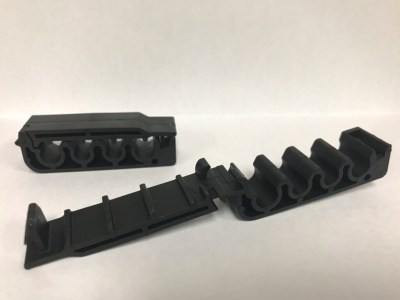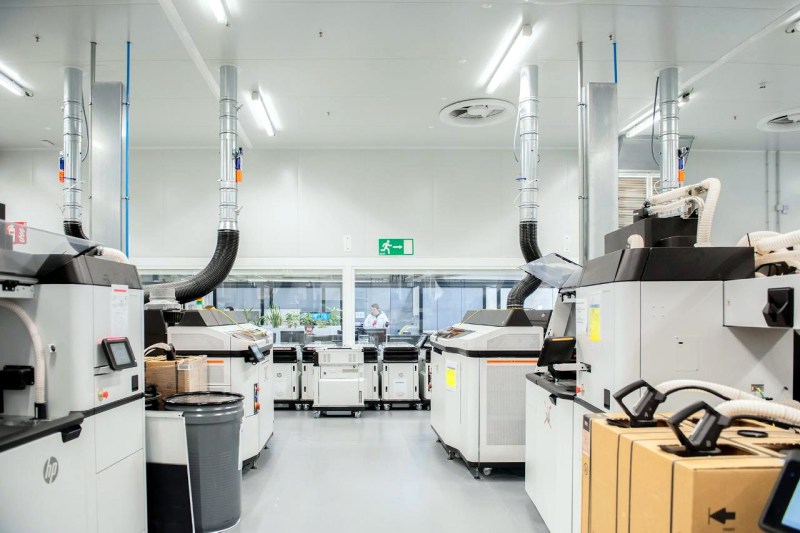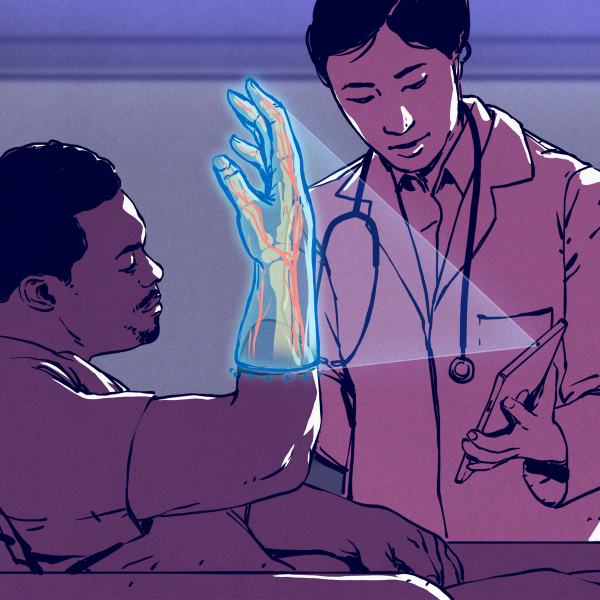This mass manufacturer movement towards electric cars is one thing, but what about sustainability on the plastic part production line? Ford and HP have teamed up to turn used 3D printed parts and powders into pellets that will be fodder for injection-molded parts — specifically the fuel-line clips for Super Duty F250 trucks.

According to Ford’s press release, their goal is to reach 100% sustainable materials in all their vehicles, not just the diesel-drinking Super Duty. Their research team found ten other Fords whose existing fuel-line clips could instead be made sustainably, and the company plans to implement the recycled plastic clips on all future models.
There are all sorts of positives at play here: the recycled clips cost 10% less to make and end up weighing 7% less than traditionally-made clips, all the while managing to be more chemical and moisture resistant.
And so much plastic will be kept out of landfills, especially once this idea takes off and more manufacturers get involved with HP or form other partnerships. One of the sources of Ford’s plastic is Smile Direct Club, which has 60 printers cranking out over 40,000 dental aligners every day.
There’s more than one way to combine 3D printing and sustainability. Did someone say fungal sound absorbers?
[Images via Ford]
















This is great for the PR…. If you are asking yourself where is the hack, you are at the wrong site.
A very nice proof of concept taken to production – Reuse of this waste in a beneficial way to all, that should be scaleable for other uses… I’d call it a worthy hack on the normal, wasteful, completely disjointed from reality of the normal production line, hopefully means proper and convenient facilities for dumping the waste parts, without it being a straight to landfill, as nobody actually recycles the ‘recycling’ plastics they collect…
Really? Because the deck I’m looking at tight now is mostly recycled plastic. Hundreds of pounds of it.
I can’t find the statistics, but somewhere around 2012-2015, 40-70% of all “recycled” plastic when straight into landfills and incinerators instead of getting reprocessed, despite supposedly being “recycled”. This this though recollection from my memory.
I would guess it is a bit better these days.
But considering that far from all plastic even gets “recycled” to begin with, it still leaves a lot of room for improvements.
The statement “as nobody actually recycles the ‘recycling’ plastics they collect…” is not all that far away from reality to be fair.
There may also be significant regional variation, globally speaking. Which is to say, some places may be doing better than others.
Indeed Elliot, and some places may think they are doing well, because its all been shipped off to those nice Asian countries that are going to do it for you, only they don’t actually do so… But its out of sight, so its ‘recycled’.
I’ll admit I was being somewhat over exaggerating with the implication no plastic is actually recycled, but globally it is depressingly close to true. There are mountains of European plastics that are supposed to be ‘recycled’ but are actually just dumped somewhere in Asia, I expect the same is true for their locally used plastics too..
Regional variations is indeed a thing.
Some places recycles more than others.
But plastics recycling could get a lot better in general.
Though, the two main issues plaguing it currently is:
1. Plastic is too cheap for it to be cost effective to reprocess it.
2. A lot of plastics waste gets thrown into one large pile. Despite that different types of plastics have wildly different properties, in short, the mix is even less economical to reprocess.
Keeping proper separation between types would aid recycling quite a bit.
In a factory environment, a process that generates plastic waste will in general only generate one type that is also fairly known. Making the process of collecting it also rather trivial. Not to mention that it could also still be fairly clean from other debris making it even more easily reprocessed.
In the consumer/end-user environment, things are though harder. But here one could at least work on separating plastic bags from harder plastics like ABS and such. It would be a start.
Though, doesn’t change the fact that it is more cost effective to just make new plastics from scratch in most cases, but better separation at least makes it easier to cross that boarder.
My thought exactly. Three names in one go for what?
HP: Hey Ford, let’s find the most insignificant part that you can make from our other client’s 3D printer waste and call it a win.
What’s the volume? 100k parts annually? 20 g?
Not a hack, an HP press statement.
Shame.
How about making printer ink cartridges with more than a raindrop of ink in them? That might help.
get rid of the cartriges, use an ink tank intead…
Why aren’t the covers that you have to remove from ink/toner cartridges recycleable HP? They currently don’t have a recycle number on them.
One of the bigger problems of recycling plastic is that it is honestly not all that easy if one catches the plastic too late in the chain.
The most profitable plastic recycling is when we capture the plastic directly where the waste is generated.
For an example, the off cuts made from an injection molding machine can very easily be gathered and it is likely known what one runs through the machine. Nor has it had time to gather other debris. (other than glass filler and such…)
But the same is true in a lot of other scenarios.
Be it 3D printer supports, plastic bags, or anything else.
In factories that builds stuff in even moderate volume will generally generate a fair bit of plastic waste, capturing and sorting it at the work benches is a lot more effective than trying to separate it apart when it has reached the dump truck. (Not saying that we should try to capture it at the bench, but the closer to the source the better, preferably the plastic waste shouldn’t exist to begin with….)
There is though already a fair bit of recycling efforts in the larger manufacturing side of the global market.
IC trays for an example can be sent back to the supplier, not all suppliers are interested in this though, and others seems a bit picky… There is though a lack of reusable packaging for transport outside of electronics, something that can be worth while looking into when having a larger supply chain to deal with. Having reusable transport packaging can even end up more economical in the long run in some cases.
But one of the big issues of plastics recycling is that it simply isn’t all that economical compared to buying new plastic.
The difference in price isn’t huge. And most efforts currently is more for the PR than the economics. It is technically economical from a marketing standpoint, going green lures in more customers after all.
Though, a lot of places don’t give much thought about recycling to be fair.
It isn’t all that much effort to at least put plastic in a separate bin. Though, where I work, the company handling our plastic trash is really picky about what types of plastics we throw into the bin, if they see anything incorrect they will instead just incinerate the whole thing… Though, thankfully the majority of the plastic waste is fine. If only they took other types of plastic too, even if it is in a separate bin, but nope, too much work.
But even in the end.
If one actually makes the effort to “recycle” plastic, a lot of what goes into recycling bins in most cases ends up in land fills and incinerators regardless…. Actually reprocessing it isn’t all that economical compared to making new plastic from scratch.
One issue with recycling is it turned into a business instead of a responsibility. I look at a story like this and wonder why they haven’t been doing this for some time already. Reading about what happens to much of the recycling collected is a bit disheartening. Not sure what can be feasibly done with this topic, as business won’t do a thing unless there is some kind of angle involved, people likely aren’t going to stop buying cheap plastic stuff, or even have a choice as most needed items have some sort of plastic involved. If my slice of heaven is any indication, way more recyclables go into the landfill than the recycle dumpsters, by more than a lot. This really is/has been an issue for too long. I suppose a long hard look a disposal stuff like packaging could help, but this would likely step on the toes of online shopping, so…. Really, how hard do we really want to look at recycling.
One problem with plastic is that there is hundreds, if not thousands of very different materials called plastic.
Recycling will always be costly, and most often not feasible.
http://www.dailyimpact.net/2020/11/24/the-second-biggest-scam-ever-plastic-recycling/
Another problem (well 2 actually) often unmentioned is how long will the part made of recycled plastic last and is the recycled part recyclable. It may be only me but it is likely when looking for a used car to find the originals dangling because they broke where they snap on to a metal support or elsewhere which leads to trying to find a replacement and possibly replacing plug wires that settled on the exhaust manifold etc.Or the various latches or hinges break if opened for repairs. While a few cents may be saved (or not) with making a part from recycled plastic maybe far less resources could be used if the part were made more robust (better polymer for the application) in the first place so it can survive the life of the vehicle including maintenance. I consider most of these things short-sighted green marketing PR.
The article says “all the while managing to be more chemical and moisture resistant.” so chances are it lasts longer
Suppose we could come up with a recycle bins sized pellet extruder.. maybe instead of dropping an enormous volume of plastic into the dumpster, it could be turned into stock on the spot. Maybe mail off the pellets for a rebate or something. Just a thought
I think I’ve seen that effort somewhere, maybe even here. Might be part of the issue lies deeper. Much of technology is pretty mysterious for most users, almost magical (in appearance) in what it canndo for people, from medical needs to entertainment, even something as infused to our society as GPS. If you look at the marvels of technology, what it can do, from the lens of not having a clue on how it all works and simply knowing it just works, I think a lot of people just think recycling ‘works’ in the same way as other technologies. I see all sorts of non recyclable materials getting thrown in the compacter that shouldn’t be there, in my once every 2 week trip. I often wonder how that Styrofoam gets in there, plastic bags, planters and such. I suspect many simply think there is some magical machine that seperates useful stuff from not useful stuff, maybe even the trash from useful material. I don’t think this is an unreasonable thought to have, considering the technology all around us. Why isn’t such a machine in widespread use? It would seem to me to be the epitome if good use of science and technology. Imagine no recycle bins as we currently know them, everything goes into the regular trash can, at the dump the ‘machine’ seperates everything to where it properly belongs. I think this the level the recycle movement should go. I have a hard time seeing small group efforts making a dent, even though any effort should be applauded IMO. Sorry for the wall, I enjoy talking about recycling.
Yeah, hear ya there! The plastics industry made a giant promise that turned out to be a lot of smoke and mirrors.
Still, I picked up a good paper shredder for ten bucks, and now have bags and buckets full of shreds. So, first off, FML with that stuff, it seriously beats out sawdust and is really rivaling glitter for the title! Gotta squeeze it into filament or pellets as early as possible. I’m thinking mostly of bottles and jugs here. My crew is all on top of sort by the numbers, and I didn’t even ask them to. So, I really think that a black box that you put your sorted plastics in the top and swap out the bins at ther bottom is within reach.
I gots a chunk of ss tube and a fat auger bit, so I’m closing in the filament solution…
I agree any effort is laudable. The biggest threat when I started was the immense startup cost. Precious Plastics is a really great org, but the shredder they spec out.. already way outside my budget. Ten dollars has chewed up enough plastic to have to say this still needs some rethinking. No way this has to be so costly or exotic or unapproachable.
Nice greenwashing for HP, leader in production of throaway ink cartridges and shitty printers that you need to replace every 12 months because they are so poorly made. Also DRM schemes bricking their competitors’ cartridges several times a year, just because there is not enough waste already. Shame on you HP, shame shame shame!
Slow clap…
Wow. Just great. And making an piwerhog like the F250 somewhat “greener”.
Mind. Blown.
Btw. In china actual garbage is mixed in very cheap plastic. It attracts rodents. Interesting results.
Honk Honk,move over treehugger, in your polluting hybrid! Here come I in my super duper big truck with fuel line clips made out of recycled plastic.
Go F-350, or go home!
Great! Now they need drop offs so we can give them our support material, iterations and failed prints.
It’s not always “wrong” to incinerate plastic waste. If the temperature is high enough, and all the nasties can be kept out of the exhaust, burning plastic waste for electricity is fine. Better tham dumping it landfill. Better than “recycling” by burning tons of fuel to collect the waste then ship it halfway around the world. But as I said, you do need to make sure it burns cleanly.